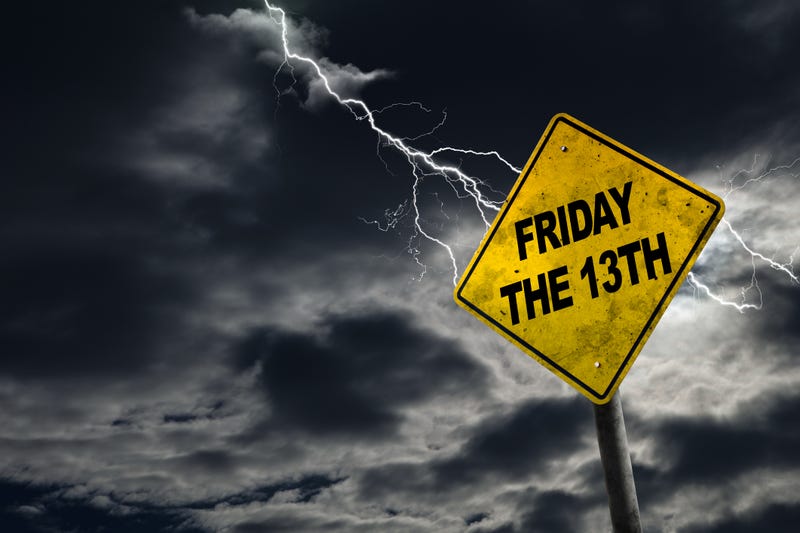
There is, on average, 1.5 days a year that land on Friday, the 13th. It is said to be an unlucky day, more than just a campy horror movie for sure. Today, January 13th, is one of those days.
But where does that come from? How did we land on “unlucky 13” and then attach it to this day and date combination? Not only that, there are two extremely difficult to pronounce terms that describe a fear of this day: paraskavedekatriaphobia and friggatriskaidekaphobia. Good luck (or unluck).
There is a real history behind it however, even if it isn't really unlucky.
The Fear Behind the Number
Seeing a black cat, walking under a ladder, and breaking a mirror. All superstitions and beliefs that bad luck can be attached to a seemingly simple act. And most of those can be chalked up to a misunderstanding. The number is no exception.
According to the History Channel, the fear of Friday the 13th goes back 13 centuries.
Western culture associates the number 12 with a sense of completeness. There are 12 days of Christmas for example. 12 tribes of Israel, 12 Zodiac signs, 12 Gods of Olympus, etc. We have 12 months of the year too.
The number 13 and its unlucky roots might come from an ancient text called the Code of Hammurabi, which reportedly omitted a 13th law from its list of legal rules. It is one of the earliest and most complete written legal codes and was proclaimed by the Babylonian King Hammurabi, who reigned from 1792 to 1750 B.C. But it turns out, the omission of the 13th law was simply a clerical error made by an early translator. There is actually not a numerical list at all.
It is also tied to Christian religion in a way. The 13th guest to arrive at the Last Supper was the man who betrayed Jesus, Judas Iscariot according to Bible texts.
Then there is the Norse religion that says the mischievous God Loki (no, not the Marvel comics version) was also a 13th guest at a dinner in Valhalla which upset the balance of the 12 Gods already in attendance.
Oddly, the number 13 only seems to be a Western issue. In ancient Egypt and in Asia, there is no such superstition around the number.
The Knights Templar
If you’ve seen or read Dan Brown’s “DaVinci Code” you’ve heard of this famous group of medieval Knights of Templar. Founded in 1119, headquartered on the Temple Mount in Jerusalem, they existed for nearly two centuries during the Middle Ages.
In 1307, King Philip IV of France, deeply in debt and distrustful of the Templar Knights, pressured Pope Clement to have many of the order's members in France arrested, tortured into giving false confessions, and then burned at the stake. Under further pressure, Pope Clement V disbanded the order in 1312. The abrupt disappearance of a major part of the European infrastructure gave rise to speculation and legends, which have kept the "Templar" name alive into the present day.
That end for the Templars began in the early morning hours of – you guessed it - Friday, October 13, 1307. And that event launched an even longer-lasting theory about the “unlucky” or even evil properties of Friday the 13th.
The Cost of Superstition
So what, it’s just a silly superstition, right?
Well, not so fast. This little fear actually costs business interests a lot of money. For example, there is an almost irrational fear of flying on this day.
"It's been estimated that [U.S.] $800 or $900 million is lost in business on this day because people will not fly or do business they normally would do,” says Donald Dossey, a folklore historian and founder of the Stress Management Center and Phobia Institute in Asheville, N.C.
However, because demand tends to be low, it's a great day to buy a plane ticket with cheaper than normal fares according to one study.
Have the number 13 for a house number? Good luck selling it.
According to research cited by Zillow, 40% of real estate agents say that houses with a No. 13 address are known to cause resistance among buyers, and that sellers often have to lower prices as a result.
There was also a “mini” stock market crash on Friday, October 13, 1989 that has been referred to as “Black Friday”. That said, it seems to be a one-off and markets have not traditionally had bad days on a Friday the 13th.
Pop Culture Embraces the Day
Then there are the modern ties to Friday the 13th which usually wraps itself around the horror aspects of the day.
We’ve all seen the movies, most of which are either terrible or just above terrible. Even so, the movies have grossed almost $400 million since #1 came out in 1980.
Jason stalking teenagers at Camp Crystal Lake (or Manhattan for some reason) is about as cheesy as it gets. But the movies, now 12 (and counting?) have made Friday the 13th famous. Of course there is absolutely no mention of Friday the 13th anywhere in the movies, it’s just a freaky name original director and screenwriter Sean Cunningham came up with.
Haunted houses, especially when it comes in the fall do a brisk Friday the 13th business.
Yes, people plan their weddings for this day. Perhaps a little dark for most tastes? You can even go with a theme.
Bottom Line
There is no good, concrete reason for fear of Friday the 13th. Somehow unlucky 13 and this particular day have taken on a life of their own.
Naturally, as we do with most things, we’ve turned it into a money-making, pop culture phenomenon.
Kick back, head to a haunted house, flip on any streaming service that most certainly has a Friday the 13th movie, and enjoy the campy fun. But don’t worry about your money or your flight. You’ll be fine.
